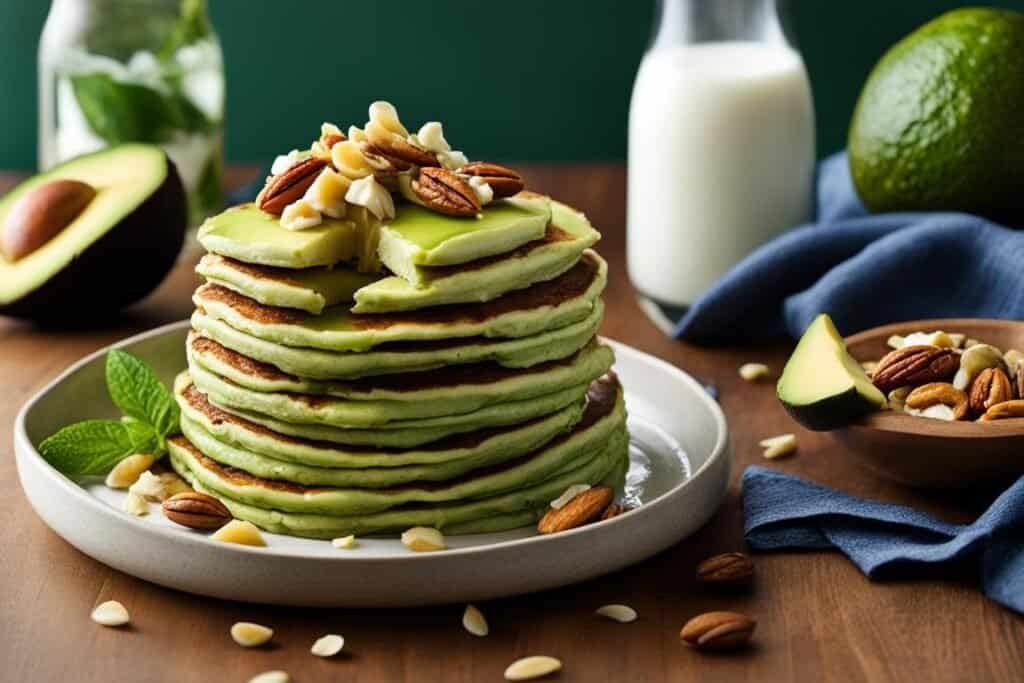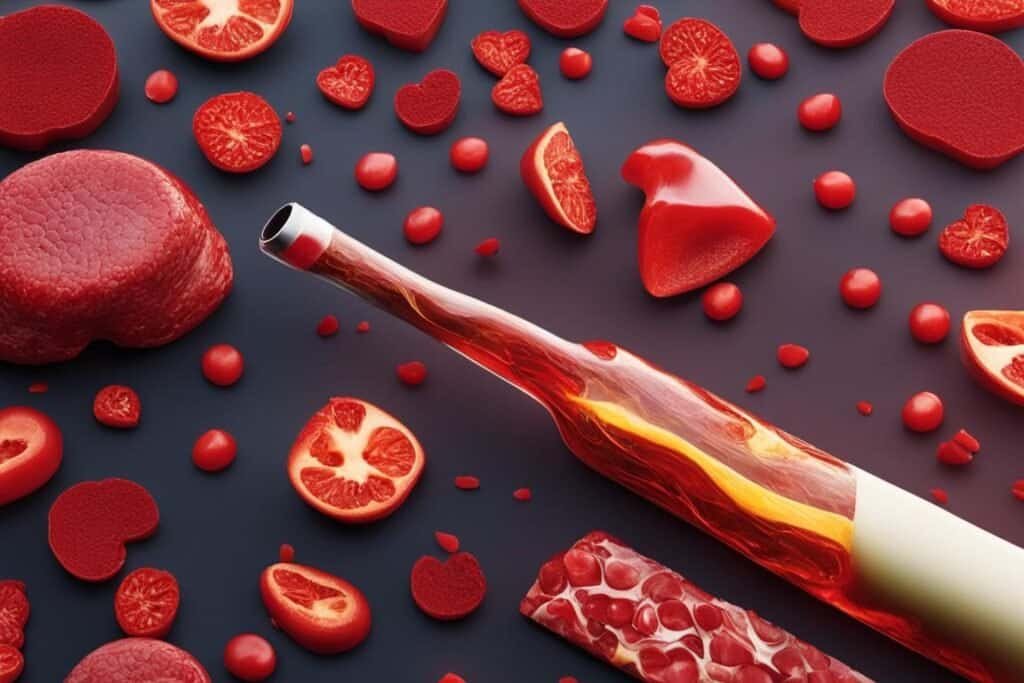When it comes to cholesterol, there is a lot of confusion and misinformation out there. Many people believe that all cholesterol-rich foods are bad for you, but that’s not entirely true. In fact, certain foods that contain cholesterol can be part of a healthy diet.
In this article, we will debunk some common myths about cholesterol in food and provide you with a list of healthy options to include in your diet. Understanding the role of cholesterol in food is important for making informed choices that benefit your overall health.
So, let’s dive in and discover the cholesterol-rich foods you should know about.
Key Takeaways:
- Not all cholesterol-rich foods are unhealthy.
- Dietary cholesterol does not significantly impact cholesterol levels for most people.
- Healthy high cholesterol foods provide important nutrients.
- Avoid high cholesterol processed and fried foods for better heart health.
- Include lifestyle changes like physical activity and a balanced diet for optimal cholesterol levels.
7 Healthy Foods That Are High in Cholesterol
Incorporating healthy high cholesterol foods into your diet can provide important nutrients and contribute to a balanced eating plan. Despite their cholesterol content, these foods offer numerous health benefits. Here are 7 cholesterol-rich foods that you can enjoy:
- Eggs: Despite their cholesterol content, eggs are packed with protein, vitamins, and minerals. They are a versatile ingredient and can be prepared in various ways, such as boiled, poached, or in omelets.
- Cheese: Cheese is a delicious source of calcium and protein. Opt for low-fat or reduced-fat varieties to keep the saturated fat content in check.
- Shellfish: Shrimp, lobster, and crab are excellent sources of protein and essential nutrients. They are low in saturated fat and can be enjoyed as part of a healthy diet.
- Pasture-raised steak: High-quality, grass-fed beef is a rich source of protein, vitamins, and minerals. Choose lean cuts and moderate your portion sizes.
- Organ meats: Liver, heart, and other organ meats are very nutrient-dense and provide essential vitamins and minerals. However, consume them in moderation due to their high cholesterol content.
- Sardines: These small fish are a great source of omega-3 fatty acids, which are beneficial for heart health. They also contain protein and other important nutrients.
- Full-fat yogurt: Despite its cholesterol content, full-fat yogurt contains probiotics and essential nutrients. It can be a healthy addition to your diet when consumed in moderation.
Research suggests that some of these cholesterol-rich foods, like eggs and full-fat yogurt, may even have heart-protective effects. So, don’t be afraid to include them in your meals while maintaining an overall balanced diet.

Explore the Nutritional Content of These Cholesterol-Rich Foods:
| Food | Cholesterol Content (mg) |
|---|---|
| Eggs (large, cooked) | 186 |
| Cheddar Cheese (1 slice, 28g) | 29 |
| Shrimp (3 oz, cooked) | 179 |
| Beef Liver (3 oz, cooked) | 331 |
| Sardines (3 oz, canned in oil) | 142 |
| Full-fat Yogurt (1 cup) | 31 |
The Truth about Dietary Cholesterol
Contrary to popular belief, research shows that dietary cholesterol from food does not significantly affect cholesterol levels in most people. This means that consuming foods containing cholesterol, such as eggs and seafood, does not automatically increase your risk of heart disease.
It is important to understand that cholesterol is an essential component of our body’s cells and plays a vital role in the production of hormones and vitamin D. While it is true that some individuals may experience a slight increase in cholesterol levels after consuming dietary cholesterol, our bodies have a remarkable ability to regulate cholesterol production.
Focusing on overall healthy eating habits rather than fixating on the cholesterol content in food is key. By following a balanced diet that includes plenty of fruits, vegetables, whole grains, lean proteins, and healthy fats, you can help maintain optimal cholesterol levels and reduce your risk of heart disease.
Remember, it’s not just about dietary cholesterol, but also about other lifestyle factors such as physical activity, smoking, and maintaining a healthy weight that play a significant role in heart health.

While most individuals can safely consume cholesterol-containing foods without negative health consequences, it is important to note that dietary cholesterol is not the only factor that influences heart disease risk.
In fact, research suggests that the primary drivers of elevated cholesterol levels and increased risk of heart disease are trans fats, saturated fats, and added sugars. These unhealthy fats can be found in processed foods, fast food, and desserts. By limiting your intake of these high cholesterol foods, you can better manage your cholesterol levels and reduce your risk of heart disease.
Stay informed and work with a healthcare provider or registered dietitian to develop a personalized approach to your cholesterol management.
High Cholesterol Foods to Limit or Avoid
When it comes to managing cholesterol levels, making smart food choices plays a vital role. It’s essential to be aware of high cholesterol foods that can negatively impact your health. By limiting or avoiding these unhealthy options, you can take proactive steps towards better heart health.
Here are four types of high cholesterol foods to be cautious of:
- Fried foods: Indulging in deep-fried delights like french fries, fried chicken, and potato chips can be tempting. However, these foods are often cooked in unhealthy fats, which can contribute to high cholesterol levels. The excessive consumption of fried foods can also lead to weight gain and increase the risk of heart disease.
- Fast food: Many fast food options are laden with unhealthy fats, sodium, and cholesterol. Regularly consuming items like burgers, fried chicken sandwiches, and milkshakes can have a detrimental impact on your cholesterol levels. Opting for healthier alternatives, such as homemade meals or fresh salads, can be a wise choice.
- Processed meats: Sausages, bacon, hot dogs, and other processed meats are convenient choices but can be high in cholesterol and unhealthy fats. They often contain additives and preservatives that can further increase the risk of heart disease. Choosing lean cuts of fresh meat or plant-based alternatives is a healthier option.
- Desserts: While indulging in a sweet treat occasionally is fine, consuming desserts regularly can lead to high cholesterol levels. Cakes, cookies, pastries, and ice cream are often loaded with added sugars, unhealthy fats, and refined carbohydrates. Opt for healthier desserts like fresh fruits or yogurt for a guilt-free indulgence.
By minimizing your intake of these high cholesterol foods, you can better manage your cholesterol levels and reduce the risk of developing heart-related complications.
| High Cholesterol Foods to Limit or Avoid | Reasons to Limit or Avoid |
|---|---|
| Fried Foods | High in unhealthy fats and calories |
| Fast Food | Loaded with unhealthy fats, sodium, and cholesterol |
| Processed Meats | Contain additives, preservatives, and unhealthy fats |
| Desserts | High in added sugars, unhealthy fats, and refined carbohydrates |
Best Practices for Lowering Cholesterol Levels
To lower cholesterol levels and improve your overall heart health, it is important to make certain lifestyle changes and adopt healthy habits. Here are some strategies you can implement:
- Increase your fiber intake: Consuming more soluble fiber, such as fruits, vegetables, whole grains, and legumes, can help lower cholesterol levels. Aim for at least 25 grams of fiber daily.
- Stay physically active: Regular exercise can raise your HDL (good) cholesterol and lower your LDL (bad) cholesterol levels. Choose activities you enjoy and aim for at least 30 minutes of moderate-intensity exercise most days of the week.
- Maintain a healthy weight: Losing excess weight, especially around the waistline, can help lower cholesterol levels. Focus on a balanced diet and engage in regular physical activity to achieve and maintain a healthy weight.
- Quit smoking: Smoking can reduce your HDL cholesterol levels and increase your risk of heart disease. Quitting smoking can have significant benefits for your cholesterol levels and overall health.
- Eat more fruits and vegetables: Fruits and vegetables are rich in antioxidants, fiber, and other nutrients that can help lower cholesterol levels. Aim to incorporate a variety of colorful fruits and vegetables into your daily meals and snacks.
By implementing these lifestyle changes and adopting healthy habits, you can lower your cholesterol levels and reduce your risk of heart disease. Remember to consult with a healthcare professional or registered dietitian for personalized advice and guidance.
Conclusion
As you’ve learned throughout this article, not all cholesterol-rich foods are created equal. While it’s true that some cholesterol-containing foods, like eggs and shellfish, can be part of a healthy diet, others, such as fried foods and desserts, should be consumed in moderation.
To maintain a healthy cholesterol balance, it’s important to focus on a balanced diet and make healthy choices most of the time. Incorporate more cholesterol-rich foods that are also nutrient-dense, like eggs and sardines, while being mindful of portion sizes and cooking methods. Remember, moderation is key.
If you have concerns about cholesterol content or need personalized dietary advice, it is always best to seek guidance from a healthcare provider or registered dietitian. They can help you understand how cholesterol-rich foods fit into your overall diet and provide you with recommendations specific to your health needs.
By making informed choices and seeking professional guidance, you can enjoy the benefits of cholesterol-rich foods while still maintaining a healthy lifestyle. Remember, a well-rounded approach to nutrition and overall health is the key to long-term well-being.

